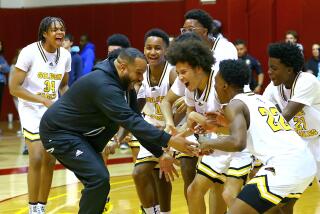PASSINGS: Charles Garland Lewis Sr., Mary Edwards, Morris Lasker
Charles Garland Lewis Sr.
Basketball coach at San Marino High
Charles Garland Lewis Sr., 97, a former basketball coach and athletic director at San Marino High School, died Dec. 6 of a heart attack at an assisted-living facility in Laguna Hills, said his son, Gary.
Lewis became the first employee hired by the San Marino Unified School District and worked at San Marino High from 1952 until retiring in 1973.
“He was just a very, very excellent coach and probably a better gentleman,” said Bob Sommers, who graduated from San Marino in 1959 and later played basketball at Stanford University.
Lewis was born April 27, 1912, in Brownstown, Ind. He played three seasons in the 1930s at the University of Kentucky for legendary basketball coach Adolph Rupp.
“Rupp heard about him, saw him and wanted him to come to the University of Kentucky,” Lewis’ son said. “Rupp went to Brownstown and talked to his parents, who said we can’t afford him to leave the farm.”
Lewis’ son said Rupp paid for workers to help at harvest time so Lewis could attend school.
At Kentucky, Lewis met and married Bobbie Holland. Gary Lewis said his parents married during Lewis’ senior year but couldn’t live together because the school would take away his scholarship because he was married.
In 2008, the basketball court was named in his honor.
“He needed to be recognized,” Sommers said.
Mary Edwards
San Fernando Valley activist
Mary Edwards, 79, a grass-roots community organizer and environmental activist in the north San Fernando Valley, died Dec. 7 surrounded by her family at Kaiser Permanente Woodland Hills Medical Center. A longtime resident of Granada Hills, she had multiple myeloma.
Chief among Edwards’ causes was the North Valley Coalition of Concerned Citizens, formed by a group of residents opposed to an expansion of the nearby Sunshine Canyon Landfill.
In a long-running legal battle against operator Browning-Ferris Industries, the community group raised funds by holding bake sales and garage sales.
“We are tenacious,” Edwards said in a 2000 interview with The Times. “We will hang in there. We will be like bulldogs at their ankle.”
As an advocate for preserving open space, Edwards worked to have parkland set aside for the Rim of the Valley trail corridor, the Santa Clarita Woodlands and the expansion of Bee Canyon Park in Granada Hills.
A social worker by training and a Quaker pacifist in her beliefs, Edwards volunteered for many projects to assist the underprivileged, including helping out at a homeless shelter, a pregnancy counseling center and a convalescent hospital.
She was born Mary Jean Wictum on Dec. 3, 1930, in Santa Monica. Her father, Holgar, was a pilot and aviation engineer who worked at Douglas Aircraft Co., and her mother, Martha, was a social worker who had helped organize unions in Ohio.
After receiving a degree in religion and philosophy from Earlham College in Richmond, Ind., Edwards returned to California and met her future husband, George. They married and had seven children.
Morris Lasker
Judge sentenced Wall St.’s Boesky
Morris Lasker, 92, the judge who sentenced Ivan Boesky to prison in a 1980s insider trading scandal and helped eliminate horrid conditions in New York City jails, died Friday in Cambridge, Mass. He had cancer, his son Timothy said.
Lasker was appointed to the federal bench in 1967. He served 25 years in Manhattan before transferring to Boston, where he worked for 15 years.
In 1987, he sentenced Boesky to three years in prison in what was then Wall Street’s biggest insider trading case, saying it was essential to incarcerate white-collar criminals.
“Breaking the law is breaking the law,” Lasker said. “Some kind of message must be sent to the business community that such activities cannot be wholly repaired simply by repaying people after the fact.”
For more than two decades, Lasker presided over lawsuits seeking to change brutal conditions in New York City jails, where suicides once occurred weekly. He ordered changes, and the city spent more than $1 billion improving conditions.
In November 1990, Lasker ordered the city to pay jailed crime suspects who didn’t get beds within 24 hours $150, as well as $100 for every 12 hours afterward until beds were provided.
“The imposition of these sanctions is done in the hope that such sums will never have to be paid because the department will be in compliance,” Lasker said.
The city eventually responded to Lasker’s orders, including rebuilding a roach- and mice-infested jail in lower Manhattan known as the Tombs after Lasker ordered it closed in 1974.
Lasker was born July 17, 1917, in Hartsdale, N.Y., and attended Harvard College and Yale Law School before serving in the Army during World War II.
-- times staff and wire reports
More to Read
Start your day right
Sign up for Essential California for the L.A. Times biggest news, features and recommendations in your inbox six days a week.
You may occasionally receive promotional content from the Los Angeles Times.






